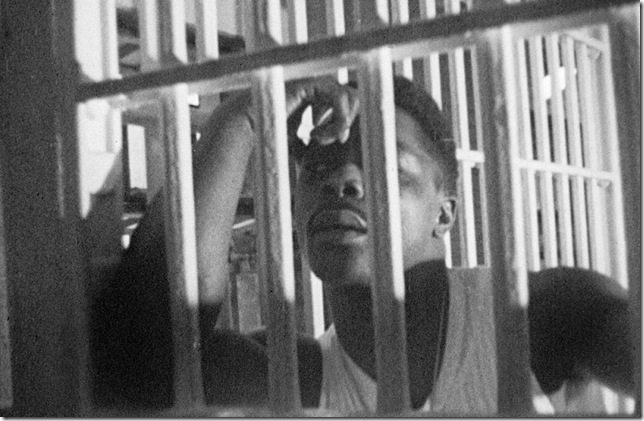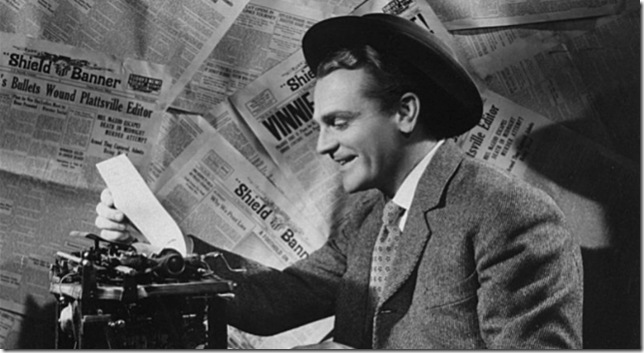The People Vs. Paul Crump: Made in 1962 for Chicago public television but considered too controversial to air, the prescient documentary The People Vs. Paul Crump finally sees the light of day courtesy of Facets ($27.98 DVD). It is essentially an hour-long interview with Crump, a professedly innocent African-American death-row inmate convicted of murdering in a white security guard in a botched robbery. The interview was conducted after 14 stays of execution.
But the film is supplemented with director William Friedkin’s dramatic re-enactments and interviews with key figures sympathetic to Crump’s case: an executioner who doesn’t believe in executions, a state’s attorney whose belief in Crump’s innocence never wavered, and a civil liberties litigant who makes cogent, leftist arguments against the death penalty and what we would now call “enhanced interrogation techniques” by the police.
The movie is notable, among other things, for being the debut feature of Friedkin, whose modern camera style and nervy urgency is already in full flower during the dramatizations; watch a few minutes of The People Vs. Paul Crump, and it’s immediately apparent you’re watching a movie by the director of The French Connection. But even without its star-director cachet, this would be a landmark film for its early hybridization of documentary and narrative elements (Freidkin must have seen John Cassavetes’ Shadows), its strikingly modern and empathetic take on capital punishment, and its acknowledgment of our criminal system’s racial double standards. Friedkin doesn’t give a voice for “The People;” this is clearly a piece of advocacy journalism, but what a vital and chilling one it is.
Like Someone in Love: In this Tokyo-set art-house inquiry from the Iranian master Abbas Kiarostami (Criterion, $33.96 Blu-ray + DVD, $21.21 DVD only), Akiko (Rin Takanashi), a sociology student and high-end prostitute, unwittingly accepts a job at the antiquated home of Takashi (Tadashi Okuno), an elderly academic and book translator. He is, presumably, unlike any john she’s had before, preferring to cook her dinner—he even researched specialty dishes from her region of Japan—and then chauffer her around the next day.
Takashi doesn’t try to dissuade Akiko from her sordid profession; Kiarostami is too intelligent a director to devolve his narrative into a maudlin “save the hooker” yarn. Rather, the aging professor’s motivations are enigmatic, and they remain so until the film’s question mark of an ending. Along the way, he strikes up a conversation with Akiko’s jealous boyfriend Noriaki (Ryo Kase), who doesn’t know how Akiko makes her income. The young couple’s relationship is predicated on deceit, and Akiko’s job is dictated by her “performances” in the fantasies of strangers; Takashi, too, will inhabit a role of sorts, “playing” Akiko’s grandfather when in Norikai’s company. Akiko, in turn, will end up impersonating the old man’s granddaughter. Reality and invention blur in a ludic style that harkens back to Kiarostami’s 1990 masterpiece Close-Up and 2012’s Certified Copy.
And because it’s often set in the interior of cars—which Kiarostami admires for their mobile suggestion of privacy in a public sphere—the movie also brings to mind his Taste of Cherry and Ten. Like Someone in Love is, therefore, a feast for Kiarostami auteurists, so frequently does his oeuvre ripple across its camera. The director’s visual scheme is, as usual, thoughtful and uncompromising, reliant on such reflective surfaces as windows and television screens to simultaneously reveal and hide.
The subject of this quiet, introspective movie seems to be the art of acting as an inherent element of life — a study of the barriers of falsehoods we erect, knowingly or otherwise. Yet the open-ended fuzziness, so appealing when exploring the weightier, life-and-death subjects of his previous movies, never satisfies with the sort of transcendent richness of which we all know Kiarostami is capable. And, beyond a heartbreaking series of voicemail recordings Akiko hears early in the film, it is absent a genuine emotional connection. It feels like a meandering and minor movie, a weigh station between the profoundly realized Certified Copy and whatever globetrotting project is coming next.
Child’s Pose: Luminita Gheorghiu, a grande dame of Romanian cinema who has been called that country’s Meryl Streep, plays an affluent set designer and mother to an apparently wayward thirtysomething man (Bogdan Dumitrache) in this psychological drama selected by Romania as its entry in the most recent Academy Awards. Gheorghiu’s character, Cornelia — jokingly called “Controlia” by her doormat of a husband—has long desired a closer relationship to her only son. When he is involved in an off-screen car accident that leads to the death of a teenage pedestrian, she springs into action, attempting whatever means necessary to save her son from prison time while reinforcing a bond that was perhaps never there in the first place.
Child’s Pose is the third film by Čalin Peter Netzer, who must be considered part of the Romanian New Wave by association only. He doesn’t possess the formal and thematic depth that colors the challenging modern masterpieces of Corneliu Porumboiu (Police, Adjective), Cristi Puiu (The Death of Mr. Lazarescu) and Christian Mungiu (4 Months, 3 Weeks and 2 Days), preferring a trendy, Americanized camera style of frantic, shaky, faux-realism that distracts more than it reveals.
Would that his fidgety cinematography and impatient editing rhythms match the quality of his screenplay and acting, and we’d really have something here, because in all other ways, Netzer’s drama is top-notch. Gheorghiu is the very picture of motherly instinct taken to plausibly exaggerated extremes, and her character comes across as both determined and pitiful, totally in control yet willfully alienating exactly what matters to her. The complex narrative is sympathetic to all parties involved in its central accident, and its cleansing conclusion is emotionally exhaustive. The script sounds fully improvised in the best way, and it’s worth noting that nobody ever looks like they’re wearing makeup, adding to the movie’s verite strengths. It’s certainly worth seeing, even if its formal style suggests an eager audition to land a job directing an American cable series.
Johnny Come Lately: This 1943 James Cagney vehicle ($18.92 Blu-ray, $16.34 DVD), directed by the competent craftsman William K. Howard, centers on a newspaper editor who is going bankrupt (suspend your disbelief) and is forced to pawn her silver to keep the paper afloat. Vinnie McLeod (Grace George) is the angelic proprietor of the struggling rag she inherited from her late husband, and she regularly opens her manse to vagrants. One such hobo, Tom Richards (Cagney), turns out to be an accomplished, out-of-work newspaperman with a dormant passion for muckraking, and he helps revitalize McLeod’s publication by using it to unseat a corrupt Boss Tweed type (Edward McNamara).
The movie’s depiction of a dusty, second-run newspaper office is hilarious, including a single, drunken old staff writer who nurses a pet mouse. But Johnny Come Lately is really about the gradual building of a populist uprising — a sort of proto-Occupy Wall Street. Its message is potent, if not subtle, and it works despite its occasionally hysterical melodramatic detours. It makes a moral argument for crusading reportage, a perennially relevant jolt to a supine media. Hattie McDaniel offers typically sour and deadpan support as McLeod’s housekeeper (naturally), and, as the political kingpin’s Karl Rove-type criminal genius, actor Norman Willis displays a voice fit for silent films. As usual, Olive’s Blu-ray transfer looks gorgeous.
3 Days to Kill: In this ridiculous actioner directed by McG (Fox, $19.96 Blu-ray + DVD, $14.96 DVD), Kevin Costner’s grizzled, sadistic CIA agent Ethan Renner is introduced with a cough, which in Hollywood movies can only mean one thing: Yup, he’s dying. Of terminal brain cancer. Following a three-to-five-month prognosis, he’s booted out of his job and soon finds that squatters have adopted his Parisian apartment, leaving him with little choice but to reconnect with his ex-wife (Connie Nielson) and estranged daughter (Hailee Steinfeld). Yep, he’s also a delinquent dad — as the film’s requisite antihero with a fatal flaw, he’s got a number of said flaws.
As far as his health goes, his only hope is to accept an experimental treatment from a sexpot fellow-agent named Vivi Delay (Amber Heard, looking every bit like a plastic Barbie), whose function within the CIA is surely skin-deep, in return for his services in slaughtering a criminal syndicate. Ethan’s covert reintegration into the agency has to be kept secret from his family, who won’t take him back if he’s “working,” which leads to much silly comic business involving the protagonist’s juggling of work and life.
The scenes between Costner and Steinfeld provide the movie its soul, which gives it something of a leg up on the parade of aggressively vacuous studio action movies (think The Expendables franchise). Like its multitasking hero, this is a film that balances many genres and moods. Unfortunately, most of them are riddled with clichés that have been exhausted for decades, exemplified by a strip-club scene whose T&A is so gratuitous it almost plays like self-parody.
If only McG were that clever (Luc Besson, who co-wrote the screenplay, might be, but I have a feeling most of his original contributions were silenced like so many of Renner’s antagonists). He over-edits the movie to death, and it feels at least a half-hour too long.




